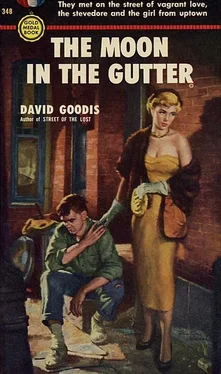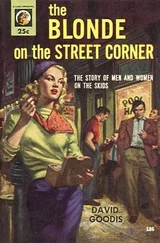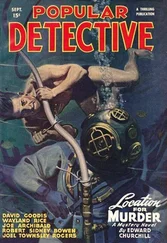“One of these nights it’ll really hit you and you’ll be carried out on a stretcher.” She was looking down at her brother as though examining a curious exhibit. “I’m absolutely certain you’ll wind up in a hospital. Is that what you want?”
“I want you to leave me alone.” He looked up at her, smiling faintly. “I hope it’s not asking too much, but I’d really be grateful if you’d leave me alone.”
“I can’t do that,” she said. “I’m much too fond of you.”
“That’s awfully sweet,” Channing said. He looked at Kerrigan. “Don’t you think that’s sweet? Wouldn’t you say I’m fortunate to have such a nice sister?”
Kerrigan was silent.
He heard her saying, “You’re not polite, Newton. You ought to introduce your friend.”
“By all means,” Channing said. Then, to no one in particular, “Please forgive my bad manners.” He half stood, and waited for Kerrigan to stand. But Kerrigan sat there. Channing shrugged, lowered himself to the seat, and poured more whisky into the glass. Then he went to work on the whisky.
“I’m still waiting,” she said. “I’m waiting for the introduction.”
“Oh, the hell with it.” Channing took a big gulp of whisky. “As a matter of fact, the hell with everything.”
She looked at Kerrigan. She said, “I’m sorry. He doesn’t really mean that. It’s just that he’s drunk.”
“It’s all right.”
She studied Kerrigan’s face. “Please don’t be offended.”
He spoke a trifle louder. “I said it’s all right.”
“Sure it’s all right,” Channing said. “Why shouldn’t it be all right?”
She looked at Channing. “You be quiet,” she said. “Just sit there and drink your whisky and don’t say anything. You’re in no condition to say anything.”
Channing sat up stiffly. He stared off to the side, his eyes focused on nothing. “What do you know about my condition?”
She didn’t bother to answer. She turned to Kerrigan. “May I introduce myself? I’m Loretta Channing.”
“That means a lot to him,” Channing said. “It’s very important that he should know your name. Why don’t you give him your address? Tell him he’s welcome any time. Invite him to dinner.”
She went on looking at Kerrigan.
And Channing said, “He doesn’t think you mean it. You’ve got to make it more sincere. Don’t stand there looking down at him. Sit beside him.”
“I told you to be quiet.”
“Go on, sit beside him. Take hold of his hand.”
“Will you shut your mouth?”
Channing was laughing. “Prove it to him, let him know you’re on the level. Maybe you’ll convince him if you drink from his glass.”
“Maybe I’ll slap your face,” she told Channing. “You’re not too drunk to get your face slapped.”
Channing went on laughing. It was almost soundless laughter and gradually it subsided and became a series of little gasps, more like sobs. He made a grab for the glass and tossed more whisky down his throat. Then he turned so that he faced the wall. He sat there drinking and staring at the wall as though he were in a room alone with himself.
She was looking at Kerrigan, waiting for him to tell her his name.
He swallowed hard. “My name is Kerrigan.” He said it through his teeth. “William Kerrigan. I live right here on Vernon Street. The address is Five-twenty-seven.”
Then he got up from the table, and he was facing her and standing close to her. There was a heaviness on his chest and it caused him to breathe hard.
He said, “Got it straight? It’s five-twenty-seven Vernon.” He was trying to say it calmly and softly, with velvety sarcasm, but his voice trembled. “You’re welcome to visit there any time. Come over some night for dinner.”
She winced and took a backward step. He moved past her and headed for the door and walked out.
As he hit the street he felt better, remembering the way she’d winced. It wasn’t much, but it was something. It offered a little satisfaction. But all at once she faded from his mind and everything faded except the things in front of his eyes, the rutted street and the gutter and the sagging doorsteps of decaying houses.
It struck him full force, the unavoidable knowledge that he was riding through life on a fourth-class ticket.
He stared at the splintered front doors and unwashed windows and the endless obscene phrases inscribed with chalk on the tenement walls. For a moment he stopped and looked at the ageless two-word phrase, printed in yellow chalk by some nameless expert who’d put it there in precise Gothic lettering. It was Vernon Street’s favorite message to the world. And now, in Gothic print, its harsh and ugly meaning was tempered with a strange solemnity. He stood there and read it aloud.
The sound was somehow soothing. He managed to smile at himself. Then he shrugged, and turned away from the chalked wall, and went on walking down Vernon Street.
He walked slowly, not with weariness, but only because he didn’t feel quite ready to go home and he wanted the walk to last as long as possible. From a small pocket in his work pants he took out a nickel-plated watch and the dial showed twenty past one. He wondered why he wasn’t sleepy. On the docks today he’d put in three hours’ overtime and he’d been up since five in the morning. He knew he should have been in bed long ago. He couldn’t understand why he wasn’t tired.
He moved past the vacant lots on Fourth Street and walked parallel to a row of wooden shacks where the colored people lived. One of the shacks contained a still that manufactured corn whisky. The bootlegger’s neighbors were elderly churchgoing people who continually reported the bootlegger to the authorities, and were unable to understand why the bootlegger was never arrested. The bootlegger could have told them that he always handed his payoffs to the law when his neighbors were in church. It simplified matters all round.
Bordering the wooden shacks there was an alley, then another vacant lot, then a couple of two-storied brick tenements filled with Armenians, Ukrainians, Norwegians, Portuguese, and various mixed breeds. They all got along fairly well except on week ends, when there was a lot of drinking, and then the only thing that could stop the commotion was the arrival of the Riot Squad.
Passing the tenements, he crossed another alley and arrived at the three-storied wooden house that was almost two hundred years old. It was owned by his father and it had been handed down through four generations of Kerrigans.
He stood there on the pavement and looked at the house and saw the loose slats and the broken shutters and the caved-in doorsteps. There was only a little paint clinging to the wooden walls and it was chipped and had long ago lost its color, so that the house was a drab, unadorned gray, a splintered and unsightly piece of run-down real estate, just like any other dump on Vernon Street.
The Kerrigans occupied only the first floor; the two upper floors were rented out to other families, who were always bringing in more relatives. There was really no way to determine how many tenants were upstairs. From the noise they usually made, it sometimes seemed to Kerrigan that he was living underneath a zoo crammed to the limit with wild animals. But he knew he had no right to complain. The first floor did all right for itself when it came to making noise.
He opened the front door and walked into a dimly lit parlor that featured a torn carpet, several sagging chairs, and an ancient sofa with most of the stuffing falling out of the upholstery. His father, Tom, was sound asleep on the sofa, but he awakened and sat up when Kerrigan was halfway across the room.
Tom Kerrigan was fifty-three, an extremely good-looking man with a carefully combed pure-white pompadour, a tall and heavy and muscular body, and absolutely no ambition. At various times in his life he had shown considerable promise as an Irish tenor, a heavyweight wrestler, a politician and a salesman and a real-estate agent. He might have attained the heights in any of these fields, but he was definitely a loafer, and the more he loafed, the happier he appeared to be. As he sometimes put it, “It’s a short life and there ain’t no sense in knocking yourself out.”
Читать дальше












